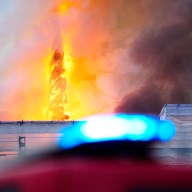BAGHDAD – A double truck bombing Monday in Mosul and blasts in Baghdad brought the Iraqi death toll to more than 100 in three days, the worst spasm of violence the country has suffered since U.S. forces left the cities.
The bloodshed threatened to chip away at public confidence in the U.S.-backed government as it seeks to project a sense of normalcy ahead of next year’s national elections, including an announcement last week that all concrete blast walls will be gone from Baghdad’s main roads by mid-September.
The Mosul bombing, like another Friday on the fringes of the ethnically tense city, targeted ethnic minorities, indicating that insurgents are seeking out relatively undefended targets to maximize casualties as the strapped Iraqi army focuses its efforts on more central areas.
The attacks in Mosul, which the U.S. military has called the last stronghold of al-Qaida, killed 28 people Monday and 44 on Friday. It’s the first time since the U.S. turned urban security over to the Iraqis on June 30 that insurgents have managed to stage two massive attacks in short order.
Another 22 Iraqis, mostly day labourers, died in two bombings in Baghdad on Monday. Seven Shiite pilgrims also were killed by bombings in Baghdad on Friday.
The latest deaths raise to at least 158 the number killed in the first 10 days of August – more than half the 309 killed in all of July, according to an Associated Press tally.
“We call on the government to make clear the real security situation in Iraq,” said lawmaker Alaa Maki of the minority Sunnis. “We are not convinced by statements that everything is OK … Iraqi people want security.”
However, it’s difficult to detect a trend. The rate of bombings tends to rise or fall month by month. This could mean the insurgents are trying to keep the authorities off balance, or that they are too weak to carry out the sustained campaigns that typified earlier years of the U.S. occupation.
Ayad al-Samarraie, the parliamentary speaker, insisted the upsurge was not a direct result of the Americans withdrawing. “The American troops are still in their camps and the intelligence co-ordination and mobilization assistance still exists,” he said.
The U.S. military has stressed that violence overall is low compared with past year. American commanders also have warned al-Qaida in Iraq and other Sunni insurgents would try to re-ignite sectarian violence but said Shiites are showing restraint and not retaliating as they did more than two years ago when the country came to the brink of civil war.
Army Col. John R. Robinson, a U.S. military spokesman, said attacks nationwide have averaged 100 a week or fewer for several months, compared with about 200 per week last year.
“We have consistently said that insurgents and terrorists will attempt to challenge the Iraqi security forces, as well as the commitment of the Iraqi people to a peaceful future,” Robinson said in an email.
“They are targeting innocent civilians, Christian churches, mosques, and police,” he wrote, but added: “We are encouraged that Iraqis are staying the course, away from sectarianism.”
The two explosives-laden trucks didn’t draw suspicion because they had been parked about 500 yards (meters) apart overnight in an alley in Khazna, just east of Mosul. The village has a population of some 3,000 people who are nearly all Shabak, a small, mostly Shiite ethnic group with their own distinct language and belief system.
They are part of the mosaic of ethnic and religious minorities in Iraq’s north that include Yazidis, Assyrian Christians, Turkomen and Kurds, all of whom have been targeted in the past. The village which was hit Friday and its mosque flattened is Turkomen.
No one claimed responsibility for either of the Mosul bombings, but they bore the hallmarks of al-Qaida in Iraq and other Sunni insurgents who remain active in Mosul and surrounding areas.
Witnesses described a chaotic scene of rescuers searching through the rubble of some 30 houses that were destroyed. Many villagers were sleeping on their roofs because of the summer heat. “If we had slept inside, we would have been killed,” said Mahmoud Hussein, 28.
The 5 a.m. explosions left a 7-foot (2 metre) crater and reduced the houses to piles of bricks, twisted metal and smoking debris.
There were conflicting death tolls, common in Iraqi bombings. Police and hospital officials said at least 28 people were killed, the U.S. military said at least 35 were confirmed dead, while Qusai Abbas al-Shabaki, who represents the Shabak minority on the provincial council, said 43 died.
He accused security forces of failing to protect the area on the eastern outskirts of Mosul.
Also on Monday, a string of bombings in mainly Shiite areas in Baghdad killed at least 22 people, most of them labourers.
One bomb was left in a cement bag. Another apparently was in a minibus. “Some passengers, women and children, got off the minibus there. Then it drove a few meters and exploded. We unloaded four people dead,” said a witness, Hassan Mohammed.
Prime Minister Nouri Al-Maliki ordered Defence Ministry officials to do all they could to “chase the terrorist cells so they can no longer find a safe place to put together their plans or be able to carry them out.”
–
Associated Press Writers Chelsea J. Carter and Hamid Ahmed in Baghdad and the AP News Research Center in New York contributed to this report.













